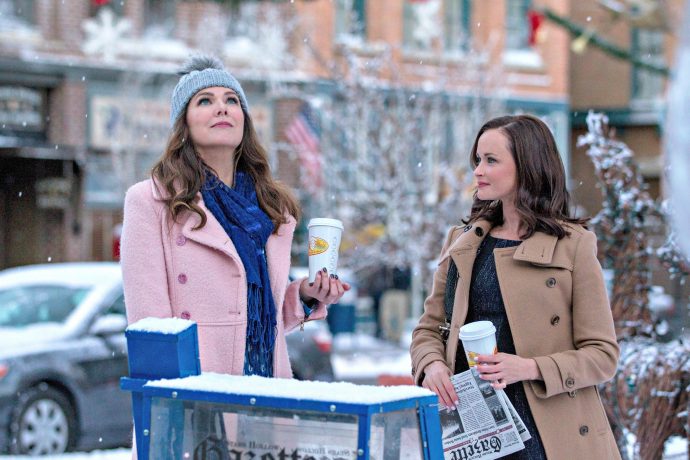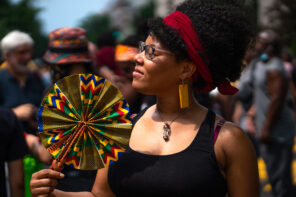I like to think that I was binge-watching long before it was cool. Back in the mid-2000s, before Netflix sparked the close personal relationship between you and your computer screen, I was watching Gilmore Girls for hours on end on a tiny portable DVD player in my childhood bedroom. Twelve-year-old me seemed to think that the closer I could keep the show to me physically, the more “mine” it was. Sharing it with anyone else was unthinkable. I still remember the time that my mother, seeing me watch Gilmore Girls on the TV in our common room (it was the first year that my obsession overlapped with the airing of a new season, and so I was forced to turn to the larger screen) decided to watch a few minutes of the show; “I didn’t realize that the ‘Gilmore girls’ were a mother and daughter,” she commented. A chill ran down my spine at even that benign remark; hearing something about the show spoken aloud, outside of my own head, felt unnatural.
I realize now that most of my experiences with culture have been this way. I enjoy books and shows and albums alone, behind closed doors and on headphones and small screens. Sharing my passions with others feels like a painful chipping away at that first magical moment of discovery. How could I possibly explain it without tampering with it? How could someone else possibly respond without misunderstanding or belittling my experience?
If culture is my internal ritual, religion has always been my external one. It’s not the solitary prayer on Yom Kippur that gets me, but the chorus of hundreds of voices singing “Repentance, Prayer and Charity change the evil of the decree.” Moreover, often it’s talking about the ritual that gives it meaning for me, that makes it “sacred.” So why have I never been able to do the same for the culture I consume?
With this year’s revival of Gilmore Girls, I was forced to grapple with my old habit of keeping TV to myself. In the long lead-up to the Thanksgiving release of four new episodes, the Internet was abuzz: friends excitedly making plans to drink wine together while watching or to host dress-up viewing parties; a fan mourning her mother, who had been her Gilmore Girls watching partner and recently passed away. This profusion of communal rituals makes sense—Gilmore Girls was itself a show about ritual. Weekend nights with junk food and bad-in-a-good-way movies were observed with the careful consistency of the Sabbath, and being a part of the Gilmore girls’ world required meticulous study of a cultural lexicon, the key texts of which included, but were not limited to, every episode of The Donna Reed Show and every item on the Chinese takeout menu. What the girls say to Gilmore neophyte Dean when he asks about The Donna Reed Show is telling: “It’s a lifestyle. It’s a religion.”
Gilmore Girls, too, was a religion, and the revival has capitalized on the rituals of being a fan. In October, Netflix converted over 200 diners across America into pop-up versions of Luke’s Diner, the show’s trademark coffee spot, and fans trekked distances to wait on line with other people who love the show enough to be there. Most fans seem to want exactly this: to wait for the revival together, and then to experience it together.
Fans were engaging in communal ritual even when I was first getting into Gilmore Girls, but the trend seems to have grown with time. It’s paradoxical: Netflix and other streaming services have simultaneously produced the personal TV ritual and the communal one. You binge, usually alone, but somewhere along the way you become initiated into a larger community of binge-watchers. The computer, that vehicle for solo watching, seems equally responsible for this transition into the communal.
The Internet functions as a sort of midway point between the personal and the public: you can be part of a community of fans, and yet you don’t have to bare the depths of your soul. It’s like praying silently in a crowded temple and knowing without turning around that the person behind you is doing the same thing: communal ritual without the risk of looking someone in the eye.
Remembering that online interactions aren’t honest person-to-person experiences can help make the pain caused in these spheres hurt less, but as the presidential election jarringly reminded us, the Internet has remarkable power. Our little personal-but-public communities are insulating, and they’re dangerous.
The Gilmore Girls revival pokes fun at the bubble of Stars Hollow, the small Connecticut town that is Lorelai and Rory’s whole world; in a running joke, the name of Rory’s less-than-thrilling but perfectly kind boyfriend Paul is consistently forgotten by the Gilmore clan. It’s funny at first, but then you can’t help but cringe at how truly awful it is—newcomers are simply not welcome here. The metaphor feels apt. What we read when we scroll through Facebook does something—the difference between names we see often enough to remember and those we don’t actually means something.
But maybe this is where hope lies. Amidst the flurry of post-election news coverage, I worried I wouldn’t have it in me to explore the many online debriefs of the Gilmore Girls revival, but it turns out I felt the opposite. I read a think piece about Paris Geller’s inspiring ambition and an essay by a female journalist who grew up alongside Rory; I lamented the final four words with other disappointed fans. I didn’t engage in the conversation (until writing this piece), but I listened. I needed community, and there it was. Maybe online communities can be open and illuminating and even transformative, if we work to make them so. The outpouring of love, support and action I’ve seen on Facebook since the election is certainly a promising sign.
A cynic might predict that one day these Internet communities will be all we have. I’m not so sure. People did trek to the Luke’s Diner pop-ups, and to an almost immediately sold-out fan festival in Connecticut shortly after that. And I probably would have too, if logistics had allowed, despite my tradition of sacred loneliness. Ultimately, it’s the sacredness of the personal, that “transcendent” moment of discovering something that seems all our own, that can be powerful enough to lead us out into the communal.
Technology has blurred the lines between our personal and communal rituals, but those lines have long been fuzzy. As I work on an undergraduate thesis about narratives of transcendent experience in Sufi poetry, I’m continually struck by the role of the external and the social in so many of the seemingly solitary moments described. The dichotomy between individual and communal experience didn’t exist even before the Internet, and maybe that’s okay.
I still watched the Gilmore Girls revival alone in my room on my laptop, but I took comfort in knowing that if Rory wound up with the wrong guy and I needed somebody to complain to, I had thousands of fans at my fingertips waiting to invite me into their flawed but genuine family – and I’ll try to be brave enough to let them into my world, too.





